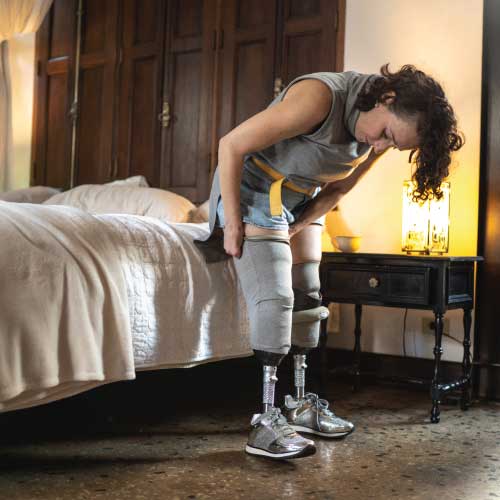Hard Insoles May Reduce Risk of Falls in Unilateral Below-Knee Amputees — study
People with limb loss have a higher risk of falling compared to able-bodied individuals, and the best way to reduce the risk is by ensuring postural stability. However, different factors can influence and determine balance and stability.

For example, people with lower limb loss greatly rely on visual information to stabilize their center of gravity more than able-bodied individuals. Other factors that affect postural stability include the surface on which they stand, like the floor surface or shoe insoles.
Although shoe insoles have been identified to enhance postural control in older adults and are considered cost-effective, quickly adopted tools to improve balance, no studies have been done on the use of insoles on the stability of individuals with limb loss. So, a group of researchers investigated how insoles can improve stability in amputee patients.
The study
The researchers recruited two groups of study participants between 18 and 70 years old. The first group comprised 25 unilateral below-knee prosthetic users, and the second group—the control group—included 25 non-amputee participants with no stability issues when standing or mobility problems. The control group participants’ medical histories did not indicate any osteoarticular or neurological disorders.
The researchers then measured the participants’ postural stability with a baropodometer, particularly the Footwork force platform. They collected data as the participants stood on the platform, with the heels placed 2cm apart and the forefoot creating a 30-degree angle. This position ensured that the center of gravity was placed within a triangle formed by the foot support.
The researchers collected data as the participants stood on the platform three times:
-
With bare feet.
-
With a hard textured surface insole (4 mm rigid material made of Polypropylene PP-DWST).
-
A soft silicone comfort surface insole (Varisan hydrogel insoles).
For each surface condition, participants were tested with their eyes open and shut.
Results
The researchers observed significant differences when comparing participants’ stability on all three surfaces with eyes open vs. closed.
In addition, the control group showed significant differences between the soft insole and barefoot or soft insole and hard insole under the same vision condition. There were also substantial differences between hard surface and barefoot for open eyes.
In amputee participants, there were differences between the surfaces relative to the average length of movement of the barycenter only for closed eyes.
Most notably, the researchers observed significant differences between the three surfaces in both groups, with the hard insole lending more excellent stability. The study identified greater stability when the barycenter movement was shorter.
When categorized from most to least stable, the researchers ranked the hard insole first for people with limb loss and the control group. Barefoot was identified as the second most stable, while soft insole was observed to be the least stable.
Conclusion
The researchers concluded that prosthetic users and non-amputees showed more excellent stability when standing on a hard insole than standing barefoot or on a soft insole. The researchers also observed that both groups had a more stable posture when they had their eyes open than shut.
With these results, the researchers have deduced that providing increased sensory inputs with hard insoles may effectively reduce the rate of falls and increase the quality of life in people with limb loss.
If you’re looking for supportive shoes that are also easy to put on, you might want to check out adaptive footwear choices.











































































